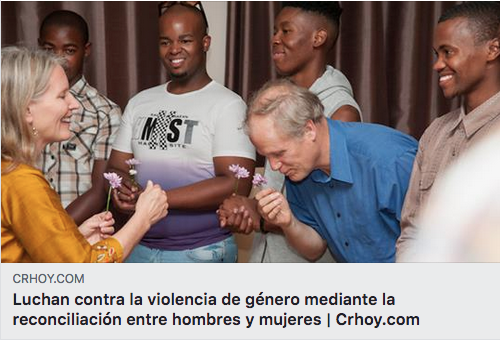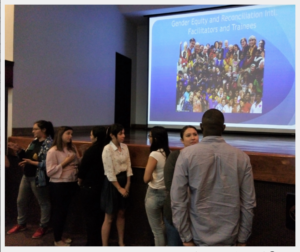AUGUST 19, 2018 12:00 AM | MANUEL SANCHO
- MEN AND WOMEN SHARE PAIN STORIES TO CHANGE
- THE PATRIARCHAL SYSTEM HAS SUPPRESSED THE STORIES OF VIOLENCE AGAINST WOMEN
“Injustice and corruption will never be transformed by keeping them hidden, but by bringing them to light and confronting them with the power of love.” Martin Luther King Jr.
The wisdom of an icon of the struggle for civil rights of the black population in the United States and the ability to forgive South Africa , a country torn by racism, inspired 2 Americans to develop a job to fight against violence and inequality of gender.
This week Cynthia Brix and Will Keepin were in Costa Rica , carrying the message of the International Gender Equity and Reconciliation Program (GERI). The organization creates a safe space for women and men to share and confront stories of the aggressions they received in the patriarchal system in which we live.
We must understand something: for millennia, during the history of mankind, we have lived with deep wounds and oppression of women across the globe . This month 2 foreign tourists were killed in Limón and Puntarenas. In Costa Rica in 2016, a total of 386 women had to be treated immediately because they were in danger of imminent death.

That reality of aggression, rape and harassment in a particular case – from film producer Harvey Weinstein – triggered the #MeToo (# YoTambién) movement in the United States and later in the world. In an interview with CRHoy.com, Cynthia Brix said that it is essential that women’s stories are known .
The system hid and oppressed the stories, the truth. That’s why you need a meeting to talk about it. Exactly GERI creates it. Brix explained that by knowing the stories of women, men are transformed , understand, show empathy for the pain that exists in the face of the violence they experienced. At that moment they can act differently.
Keepin, physicist-mathematician by profession and founder of the project, said that they were inspired by the work of the Commission for Truth and Reconciliation developed in South Africa, after apartheid (system of racial segregation in South Africa). “We think we need something similar in terms of gender,” he recalled.
Although there were attempts to bring the issue to the table, society did not succeed in the 1990s. Now GERI seeks with reconciliation to discover, unearth systematic violence from hiding . “As long as those stories are left untold, oppression is allowed to continue,” he said.
Brix, interreligious minister and co-director of the Satyana Institute, explained that women have been alert of the problem. But men are not so conscious, although it has been changing. “We’re in this together. But they socialize it outside of men, that they know they have feelings, that they suffer. It is part of machismo or masculinity in the culture, ‘be strong’, “he explained.
As detailed at the time when wounds and stories are discussed, man becomes more aware . It is something known: men are taught that they should not cry, they should not show emotion, they should not be afraid. In the workshops, people voluntarily tell their experiences . Without getting to that, we live with masks, masks of what we socially show , whether we are men or women.
That’s why when a woman tells her story of rape , something taboo even today, the man breaks down. A connection is created between both hearts , removing the masks.
Although the workshops are brief, of 3 days, GEDI struggles to maintain a network of work . They have been in 9 countries and 12 others were invited. Archbishop Desmond Tutu , a key figure in the struggle against South African apartheid, supported the organization.

In addition to discussing the methodology involves other modalities such as breathing exercises, theatrical, artistic and movement and touch. The processes are designer to reveal truths that feel . This is precisely why the conclusion of the workshops is very important, in which a ceremony is performed to honor the female gender by men, and masculine by women .
“Men feel they are responsible for violence against girls and women, and our work is really about creating a safe place so that everyone’s truth comes out without shame or guilt. It is a place where we come together and learn how to share our history and where we can listen with compassion, without telling our story as victims, but as witnesses of the truth of what has happened to us or the truth of who we are and what has formed as women and men.” Cynthia Brix